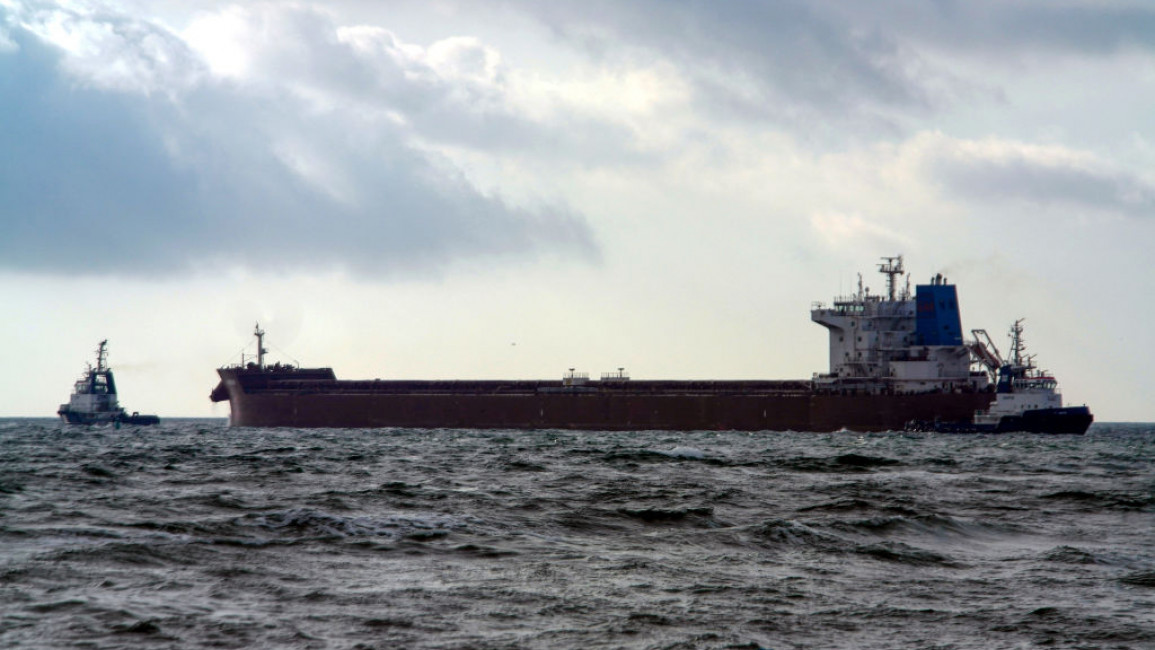Russia suspends participation in Ukraine Black Sea deal blocking 'two million tonnes of grain'
Ukraine's maritime grain exports were halted on Sunday after Russia suspended its participation in a landmark agreement that allowed the vital shipments, blaming drone attacks on its ships in Crimea.
The July deal to unlock grain exports signed between Russia and Ukraine and brokered by Turkey and the UN was framed as critical to easing the global food crisis caused by the conflict.
The agreement allowed more than nine million tonnes of Ukrainian grain to be exported and was due to be renewed on November 19.
On Saturday, Russia said it was halting its participation after its army accused Kyiv of a "massive" drone attack on its Black Sea fleet, which Ukraine labelled a "false pretext".
US President Joe Biden called the move "purely outrageous" while Secretary of State Antony Blinken said Moscow was "weaponising food".
On Sunday, the EU urged Russia to "revert its decision."
The centre coordinating the logistics of the deal said in a statement that no traffic was planned for Sunday.
"A joint agreement has not been reached at the JCC for the movement of inbound and outbound vessels on 30 October," it said. "There are more than ten vessels both outbound and inbound waiting to enter the corridor."
Ukraine's foreign minister said on Twitter that Russia was blocking "two million tons of grain on 176 vessels already at sea" that he said was "enough to feed seven million people".
He accused Moscow of having planned to "resume its hunger games" in advance and said the Black Sea explosions were "220 kilometres away from the grain corridor."
Kyiv and the UN earlier urged that the agreement remain in force.
Ukrainian President Volodymyr Zelensky called the Russian move "an absolutely transparent intention of Russia to return the threat of large-scale famine to Africa and Asia".
Stephane Dujarric, spokesman for the UN secretary-general, said: "It is vital that all parties refrain from any action that would imperil the Black Sea Grain Initiative which is a critical humanitarian effort".
Sevastopol in Moscow-annexed Crimea has been targeted several times in recent months and serves as the headquarters for the Black Sea fleet and a logistical hub for operations in Ukraine.
The Russian army claimed to have "destroyed" nine aerial drones and seven maritime ones in an attack on the port early Saturday.
"In light of the terrorist act carried out by the Kyiv regime with the participation of British experts against ships of the Black Sea fleet and civilian vessels involved in the security of grain corridors, Russia suspends its participation in the implementation of the agreement on the export of agricultural products from Ukrainian ports," the Russian defence ministry said on Telegram.
Moscow's forces alleged British "specialists", who they said were based in the southern Ukrainian city of Ochakiv, had helped prepare and train Kyiv to carry out the strike.
In a further singling out of the UK - which Moscow sees as one of the most unfriendly Western countries - Russia said the same British unit was involved in explosions on the Nord Stream gas pipelines last month.
Britain strongly rebutted both claims, saying "the Russian Ministry of Defence is resorting to peddling false claims of an epic scale".
Russia's foreign ministry spokeswoman Maria Zakharova said Moscow would raise the blasts and the alleged drone attack at the UN Security Council.
Moscow's military said ships targeted at their Crimean base were involved in the grain deal.
Russia had recently criticised the deal, saying its own grain exports have suffered due to Western sanctions.
Mikhail Razvozhayev, the Moscow-installed governor of Sevastopol, said Saturday's drone attack was the "most massive" the peninsula had seen.
Attacks on Crimea, annexed by Moscow in 2014, have increased in recent weeks, as Kyiv presses a counter-offensive in the south to retake territory held by Moscow for months.
In early October, Moscow's bridge linking Crimea to the Russian mainland -- personally inaugurated by President Vladimir Putin in 2018 - was damaged by a blast that Putin blamed on Ukraine.
Saturday's Crimea attack came as Ukraine pressed in a counter-offensive in the south aiming to retake lands held by Moscow for months.
Kyiv said Sunday its troops in the south are "holding their positions and hit the enemy in order to create conditions for further offensive actions".
Moscow-installed authorities in Kherson, just north of Crimea, have vowed to turn the city into a fortress, preparing for an inevitable assault.
Pro-Russian separatists fighting alongside Moscow announced a new prisoner exchange with Kyiv on Saturday, saying 50 will return home from each side.



